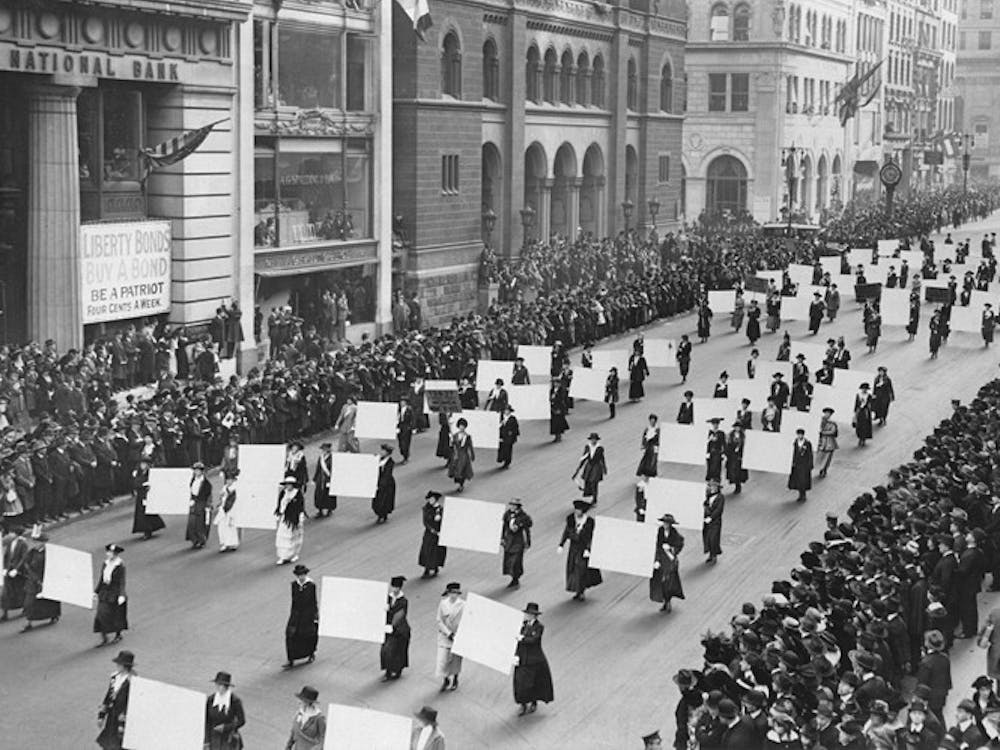In 1984, Geraldine Ferraro made history. Selected as Democratic presidential candidate Walter Mondale’s running-mate, she became the first woman to be included on the presidential ballot of a major American political party.
Meanwhile, Kristin Goss, Kevin D. Gorter professor of public policy and political science, was working toward her bachelor’s degree at Harvard University. It was the tail-end of the second wave women’s movement, and the majority of the country had begun to shift toward the Republican Party. There was a sense that the women’s movement was on the verge of dying out.
However, she recalled that women in particular were extremely politically active on campus, and Geraldine Ferraro’s appearance only added to the political excitement. It didn’t even particularly phase anyone when Mondale and Ferraro lost in a landslide Reagan victory. Goss said no one had really expected them to win anyway.
Yet, the United States has not yet seen a woman as president or vice president.
One hundred years after women were provided with their long-denied right to vote, the 19th Amendment has reshaped American politics—but women’s unfettered access to their political rights still remains in question.
On one hand, women are heading to the polls. A higher proportion of women eligible to vote than men have cast their ballots in every presidential election since 1980, according to a recent report by the Center for American Women and Politics at Rutgers University.
On the other hand, the Amendment was not designed to address the intersecting identities—such as race—that are central to women’s issues of today, Goss added.
“When I say 'women,' that's a really diverse group,” Goss said. “Some of these generalizations are going to hold more for some kinds of women than other kinds of women.”
According to Goss, women in the 20th century were active not only in “women’s issues” like abortion, but also in areas ranging from international relations to juvenile justice.
Today, women are more likely to vote for Democratic than Republican candidates and are especially active in election-time efforts like canvassing, Goss said. Although there is no major difference in opinion between men and women on most contemporary issues, Goss noted there are certain issues that do have a gender gap.
Gun control is one of them: women are far more likely than men to support regulations on gun ownership.
“To the extent that becomes an important issue in an election, politicians who are on the pro-gun-regulation side are going to have to be thinking a lot about women,” Goss said.
This upcoming presidential election cycle is the second of many young women at Duke.
Last year, junior Samhitha Sunkara, a co-founder of the undergraduate organization Women in Politics, drove back to Charlotte, North Carolina for her first election. A woman at the polling center asked if it was her first time voting, and she said that it was.
The woman announced it to the entire room, which was filled predominantly with women.
“It was really empowering,” Sunkara said. “Everyone was cheering for me. It felt so good.”
Junior Jessica Sullivan said her decision to get involved in politics was largely linked to her identity. She was influenced by her childhood in North Carolina, a place she described as “very politically volatile,” and she found that being a woman made voting seem all the more important.
“It’s harder to be heard as a woman, and I think voting is a great way to have a voice,” Sullivan said. “Historically, women haven’t always had the right to vote, and so it’s so important to recognize that and use that power that we have now.”
Sullivan is one of nine student members of the Duke Votes Coordinating Committee. Duke Votes, a group affiliated with POLIS: Duke’s Center for Political Leadership, Innovation and Service, helps students register to vote, acquire voter identification and understand the voting process.
Maryam Arain, student development coordinator at the Center for Muslim Life and a Duke Votes ambassador, explained that intersecting identities are often at the core of today’s politics.
Get The Chronicle straight to your inbox
Sign up for our weekly newsletter. Cancel at any time.
“As a Muslim woman, I’ve watched women like Rashida [Tlaib] and Ilhan Omar be really fierce and amazing in the way that they move through political spaces,” she said. “It’s definitely not just being a woman, but the intersection of me being a woman and Muslim, or me being a woman of color, that drives me more toward paying attention.”
Daisy Lane, a sophomore and another Duke Votes member, agreed.
“I’m also Hispanic, so I think that plays into my [politics] a lot,” Lane said. “I’m going to care more about immigration than somebody who isn’t a minority.”
Sunkara, whose aunt is one of the leaders of the Communist Party in India, said that seeing people like you at the forefront of politics is uplifting.
“The police actually beat her once for leading a protest, but she was so courageous about it still,” Sunkara said. “Just seeing how she’s doing so much grassroots organizing and how she has the energy to go about that is so inspiring to me.”
While women have the legal right to vote, there are still people who are left out of the political process.
For example, Sunkara said that it can be hard for people who work full-time or live far from polling locations to make it to the polls on election day. Voter disenfranchisement disproportionately affects African Americans and those who have been convicted of a felony, Arain added.
“Thinking about all the populations who don’t have the right to vote is really important to consider at a time when we’re celebrating the people who do,” Arain said.
Correction: This article was updated on Nov. 19 at 11:40 a.m. to reflect that Arain referred to Rep. Rashida Tlaib, D-Mich., not Indian politician Rakshita. The Chronicle regrets the error.

